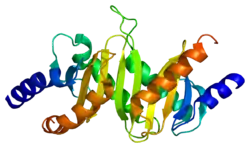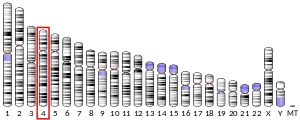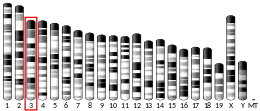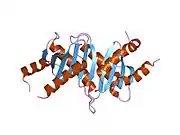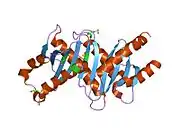MAP2K1IP1
Mitogen-activated protein kinase scaffold protein 1 is a scaffold protein that in humans is encoded by the MAPKSP1 gene.[5][6][7]
Function
The protein encoded by this gene was identified as an interacting protein that binds specifically to MAP kinase kinase MAP2K1/MEK1 and to MAP kinase MAPK2/ERK1. This protein enhances the activation of MAPK2, and thus is thought to function as an adaptor to enhance the efficiency of the MAP kinase cascade.[7]
References
- GRCh38: Ensembl release 89: ENSG00000109270 - Ensembl, May 2017
- GRCm38: Ensembl release 89: ENSMUSG00000091512 - Ensembl, May 2017
- "Human PubMed Reference:". National Center for Biotechnology Information, U.S. National Library of Medicine.
- "Mouse PubMed Reference:". National Center for Biotechnology Information, U.S. National Library of Medicine.
- Schaeffer HJ, Catling AD, Eblen ST, Collier LS, Krauss A, Weber MJ (Oct 1998). "MP1: a MEK binding partner that enhances enzymatic activation of the MAP kinase cascade". Science. 281 (5383): 1668–71. doi:10.1126/science.281.5383.1668. PMID 9733512.
- Lunin VV, Munger C, Wagner J, Ye Z, Cygler M, Sacher M (May 2004). "The structure of the MAPK scaffold, MP1, bound to its partner, p14. A complex with a critical role in endosomal map kinase signaling". J. Biol. Chem. 279 (22): 23422–30. doi:10.1074/jbc.M401648200. PMID 15016825.
- "Entrez Gene: MAP2K1IP1 mitogen-activated protein kinase kinase 1 interacting protein 1".
- Wunderlich W, Fialka I, Teis D, Alpi A, Pfeifer A, Parton RG, Lottspeich F, Huber LA (Feb 2001). "A novel 14-kilodalton protein interacts with the mitogen-activated protein kinase scaffold mp1 on a late endosomal/lysosomal compartment". J. Cell Biol. 152 (4): 765–76. doi:10.1083/jcb.152.4.765. PMC 2195784. PMID 11266467.
Further reading
- Maruyama K, Sugano S (1994). "Oligo-capping: a simple method to replace the cap structure of eukaryotic mRNAs with oligoribonucleotides". Gene. 138 (1–2): 171–4. doi:10.1016/0378-1119(94)90802-8. PMID 8125298.
- Suzuki Y, Yoshitomo-Nakagawa K, Maruyama K, Suyama A, Sugano S (1997). "Construction and characterization of a full length-enriched and a 5'-end-enriched cDNA library". Gene. 200 (1–2): 149–56. doi:10.1016/S0378-1119(97)00411-3. PMID 9373149.
- Okabe S, Tauchi T, Morita H, Ohashi H, Yoshimura A, Ohyashiki K (1999). "Thrombopoietin induces an SH2-containing protein, CIS1, which binds to Mpl: involvement of the ubiquitin proteosome pathway". Exp. Hematol. 27 (10): 1542–7. doi:10.1016/S0301-472X(99)00094-6. PMID 10517496.
- Wunderlich W, Fialka I, Teis D, Alpi A, Pfeifer A, Parton RG, Lottspeich F, Huber LA (2001). "A novel 14-kilodalton protein interacts with the mitogen-activated protein kinase scaffold mp1 on a late endosomal/lysosomal compartment". J. Cell Biol. 152 (4): 765–76. doi:10.1083/jcb.152.4.765. PMC 2195784. PMID 11266467.
- Teis D, Wunderlich W, Huber LA (2002). "Localization of the MP1-MAPK scaffold complex to endosomes is mediated by p14 and required for signal transduction". Dev. Cell. 3 (6): 803–14. doi:10.1016/S1534-5807(02)00364-7. PMID 12479806.
- Channavajhala PL, Wu L, Cuozzo JW, Hall JP, Liu W, Lin LL, Zhang Y (2003). "Identification of a novel human kinase supporter of Ras (hKSR-2) that functions as a negative regulator of Cot (Tpl2) signaling". J. Biol. Chem. 278 (47): 47089–97. doi:10.1074/jbc.M306002200. PMID 12975377.
- Paces-Fessy M, Boucher D, Petit E, Paute-Briand S, Blanchet-Tournier MF (2004). "The negative regulator of Gli, Suppressor of fused (Sufu), interacts with SAP18, Galectin3 and other nuclear proteins". Biochem. J. 378 (Pt 2): 353–62. doi:10.1042/BJ20030786. PMC 1223961. PMID 14611647.
- Vomastek T, Schaeffer HJ, Tarcsafalvi A, Smolkin ME, Bissonette EA, Weber MJ (2004). "Modular construction of a signaling scaffold: MORG1 interacts with components of the ERK cascade and links ERK signaling to specific agonists". Proc. Natl. Acad. Sci. U.S.A. 101 (18): 6981–6. doi:10.1073/pnas.0305894101. PMC 406452. PMID 15118098.
- Kurzbauer R, Teis D, de Araujo ME, Maurer-Stroh S, Eisenhaber F, Bourenkov GP, Bartunik HD, Hekman M, Rapp UR, Huber LA, Clausen T (2004). "Crystal structure of the p14/MP1 scaffolding complex: how a twin couple attaches mitogen-activated protein kinase signaling to late endosomes". Proc. Natl. Acad. Sci. U.S.A. 101 (30): 10984–9. doi:10.1073/pnas.0403435101. PMC 503730. PMID 15263099.
- Sharma C, Vomastek T, Tarcsafalvi A, Catling AD, Schaeffer HJ, Eblen ST, Weber MJ (2005). "MEK partner 1 (MP1): regulation of oligomerization in MAP kinase signaling". J. Cell. Biochem. 94 (4): 708–19. doi:10.1002/jcb.20344. PMID 15547943. S2CID 19060718.
- Pullikuth A, McKinnon E, Schaeffer HJ, Catling AD (2005). "The MEK1 scaffolding protein MP1 regulates cell spreading by integrating PAK1 and Rho signals". Mol. Cell. Biol. 25 (12): 5119–33. doi:10.1128/MCB.25.12.5119-5133.2005. PMC 1140582. PMID 15923628.
- Villegas SN, Njaine B, Linden R, Carri NG (2006). "Glial-derived neurotrophic factor (GDNF) prevents ethanol (EtOH) induced B92 glial cell death by both PI3K/AKT and MEK/ERK signaling pathways". Brain Res. Bull. 71 (1–3): 116–26. doi:10.1016/j.brainresbull.2006.08.014. PMID 17113937. S2CID 27498866.
- Teis D, Taub N, Kurzbauer R, Hilber D, de Araujo ME, Erlacher M, Offterdinger M, Villunger A, Geley S, Bohn G, Klein C, Hess MW, Huber LA (2006). "p14-MP1-MEK1 signaling regulates endosomal traffic and cellular proliferation during tissue homeostasis". J. Cell Biol. 175 (6): 861–8. doi:10.1083/jcb.200607025. PMC 2064696. PMID 17178906.
- Brahma A, Dalby KN (2007). "Regulation of protein phosphorylation within the MKK1-ERK2 complex by MP1 and the MP1*P14 heterodimer". Arch. Biochem. Biophys. 460 (1): 85–91. doi:10.1016/j.abb.2006.11.031. PMC 2853909. PMID 17254543.
- Vomastek T, Iwanicki MP, Schaeffer HJ, Tarcsafalvi A, Parsons JT, Weber MJ (2007). "RACK1 targets the extracellular signal-regulated kinase/mitogen-activated protein kinase pathway to link integrin engagement with focal adhesion disassembly and cell motility". Mol. Cell. Biol. 27 (23): 8296–305. doi:10.1128/MCB.00598-07. PMC 2169169. PMID 17908799.
This article is issued from Wikipedia. The text is licensed under Creative Commons - Attribution - Sharealike. Additional terms may apply for the media files.
